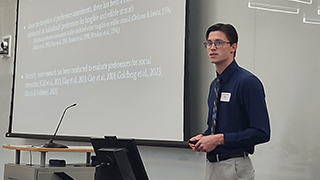Graduate Student Presents Autism Research at Statewide Behavioral Analysis Conference
Wednesday, November 12, 2025

Andrew Weiler presenting at NJABA annual conference.
Andrew Weiler, a recent graduate of the M.A. in Applied Behavior Analysis (ABA) program within the College of Human Development, Culture, and Media, presented his thesis research project at the fourth annual New Jersey Association for Behavior Analysis (NJABA) conference at Rowan University on July 26.
His presentation, “Evaluating the Effects of Social Interaction on the Results of Preference Assessments for Individuals with Autism Spectrum Disorder (ASD),” showcased how social interaction can influence the preferences of children with Autism Spectrum Disorder, specifically their opinion toward various leisure items like toys and iPads.
Weiler, a first-time conference speaker who also completed a B.A. in Social and Behavioral Sciences at Seton Hall, said it was rewarding to deliver his extensive work to event attendees and fellow researchers.
“The research topic became of interest to me as a result of my time in Seton Hall’s program and my practicum placement,” Weiler said. “Being able to watch some of the other presentations before myself helped me feel more relaxed.”
The annual conference aims to gather the leading experts and students within the world of behavior analysis for the purpose of sharing advancements made, building strong connections and maintaining an “informed professional community across New Jersey and beyond.”
Mirela Cengher, Ph.D., associate professor of psychology at the University of Maryland, Baltimore County, served as the event’s keynote speaker where she discussed her investigation into different procedural methods for teaching multiple languages to children.
Weiler said his research team of three certified behavior analysts provided invaluable guidance toward his goals. The specialists included Seton Hall University’s own Lauren Goodwyn, Ph.D., BCBA, and Frank Cicero, Ph.D., BCBA, as well as Danielle Cicalese, M.A., BCBA, of Union County Educational Service Commission Crossroads School."
“Having [a team] oversee the experiment helped me have confidence that the procedure and results were at professional research standards,” Weiler said.
His findings, acting as an extension of previous work, revealed that every research participant greatly preferred using tangible items during social interactions. After completing specific tasks, two-thirds of the participants actively sought out further social interaction accompanied by the same items during break sessions.
Weiler said his next steps involve applying to the Behavior Analyst Certification Board so that he may take the corresponding certification exam in order to become a board-certified behavior analyst. He added that any students who might consider entering the world of behavior analysis should begin researching right away.
“Start looking through published ABA research studies,” Weiler said. “This will [not only] help you get familiar with the technical language used in behavior analysis but will also allow you to find the specific areas that may interest you most.”
About the College of Human Development, Culture, and Media
Launched in summer 2023, Seton Hall’s College of Human Development, Culture, and Media
embodies the University’s commitment to pedagogical innovation, intellectual ferment
and community engagement. Uniting scholars and students from four dynamic departments
— Communication, Media and the Arts; Education Leadership, Management and Policy; Educational Studies; and Professional Psychology and Family Therapy — the college is the new home of cutting-edge, transdisciplinary inquiry into the
stickiest problems of our time.
The faculty, staff and students of the college seek to improve the human condition by collaborating across distinct fields that uniquely complement one another, thereby preparing the next generation of dynamic leaders poised to tackle contemporary social challenges and opportunities. Expression underpins all facets of the integrated college’s portfolio — media as a form of education and artistic expression; teaching and learning as modes of creative expression; expression and expressibility as critical to counseling and therapeutic treatment; and self-expression as a vehicle of social agency.
Categories: Education, Research






